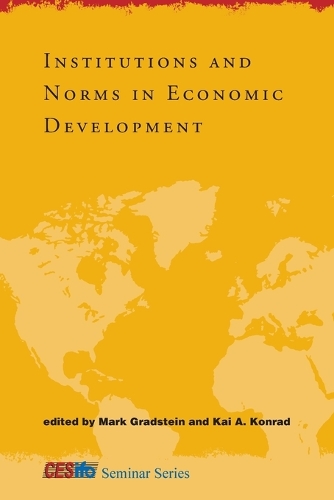
Institutions and Norms in Economic Development
(Paperback)
Publishing Details
Institutions and Norms in Economic Development
By (Author) Mark Gradstein
Edited by Kai A. Konrad
MIT Press Ltd
MIT Press
8th June 2007
United States
Classifications
Professional and Scholarly
Non Fiction
338.9
Physical Properties
Paperback
256
Width 152mm, Height 229mm, Spine 13mm
386g
Description
Experts address "the development puzzle"-unprecedented growth coupled with unequal distribution of that growth across different countries-and focus on the importance of institutional arrangements and norms and culture.Recent decades have seen almost unprecedented economic growth in income per capita around the world. Yet this extraordinary overall performance masks a wide variation in growth rates across different countries, with persistent underdevelopment in some parts of the world. This disparity constitutes "the development puzzle," and it is exemplified by growth spurts in China and India that contrast markedly with disturbingly low growth rates in sub-Saharan Africa. In this volume, economists address issues of inequality and growth, going beyond narrowly defined "economic" factors to consider the effect on growth of the structure of governance, the quality of a country's governing bodies, and the social norms that govern collective decision-making. The contributors use both formal modeling and empirical analyses to examine how the "soft factors" of institutions and norms interact with growth performance, natural resource endowments, and economic performance. They consider such topics as the effects of decentralization in Africa, fiscal discipline in Indian states, natural resource wealth as a cause of corruption, social violence during the Indonesian financial crisis of 1997 and 1998, and the effect of strong national identity on redistributive politics. Some of their findings suggest that not only do institutions and norms affect economic performance, economic performance itself is a key factor in explaining such governance failures as corruption and the frequency and intensity of economic conflict.
Reviews
"A timely and refreshing look at some classic issues. If we are to make serious sustained progress with economic growth around the world, these issues must be addressed more effectively. This book is a major step in the right direction."--Simon Johnson, Ronald A. Kurtz Professor of Entrepreneurship, Sloan School of Management, MIT
& quot; A timely and refreshing look at some classic issues. If we are to make serious sustained progress with economic growth around the world, these issues must be addressed more effectively. This book is a major step in the right direction.& quot; -- Simon Johnson, Ronald A. Kurtz Professor of Entrepreneurship, Sloan School of Management, MIT
" A timely and refreshing look at some classic issues. If we are to make serious sustained progress with economic growth around the world, these issues must be addressed more effectively. This book is a major step in the right direction." --Simon Johnson, Ronald A. Kurtz Professor of Entrepreneurship, Sloan School of Management, MIT
Author Bio
Mark Gradstein is Professor and Chair of the Department of Economics at Ben Gurion University in Israel. Kai A. Konrad is Professor of Economics at Free University of Berlin and Director at the Social Science Research Center Berlin (WZB).
